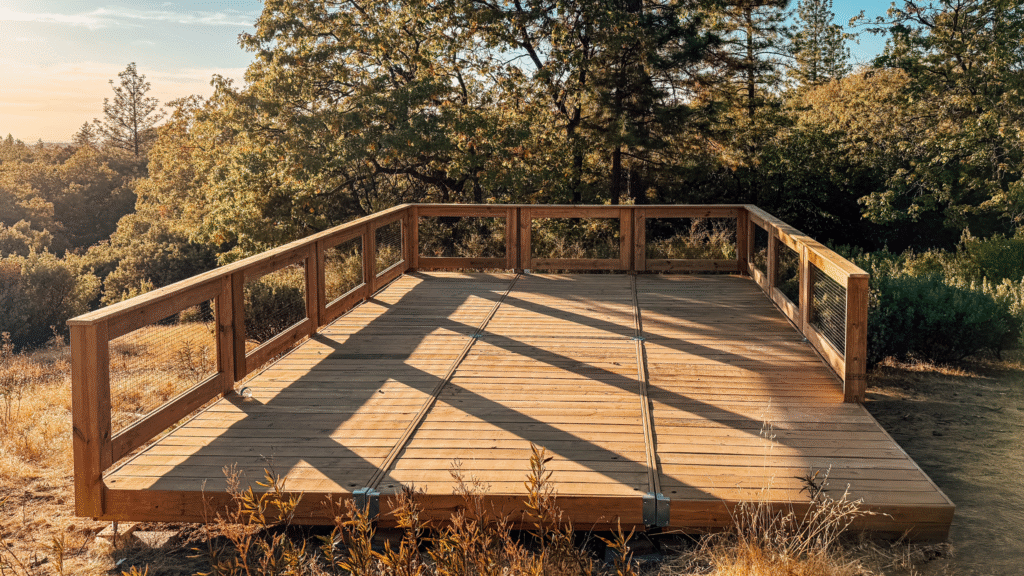
In today’s travel landscape, sustainability isn’t just a buzzword—it’s a demand. As consumers become more environmentally conscious, they seek out businesses that align with their values, particularly in the outdoor hospitality sector. Campgrounds and glamping resorts, once seen as rustic getaways, are increasingly positioning themselves as eco friendly havens that balance luxury with sustainability. At the heart of this shift is infrastructure—specifically, modular decking, which provides both environmental benefits and practical advantages for campground owners.
The global rise of eco-tourism has made sustainability a key factor in travel decisions. More than ever, travelers want to know that the places they visit have a minimal environmental impact. According to the Global Sustainable Tourism Council, eco-conscious travel now represents a significant portion of the market, with millennials and Gen Z leading the charge.
From solar-powered cabins to biodegradable toiletries, eco conscious hospitality is about offering an authentic experience while reducing carbon footprints. Modular decking is a crucial part of this narrative, helping businesses achieve sustainability goals without compromising on quality or guest comfort.
When it comes to outdoor construction, traditional materials like concrete and asphalt have significant environmental impacts. Concrete, in particular, is associated with high carbon emissions during its production. On the other hand, modular wooden decks—when sourced responsibly— offer a much greener alternative.
One of the challenges of outdoor construction is minimizing the environmental disruption caused by building projects. Concrete pads or large permanent structures often require digging, grading, or altering the landscape, which can lead to soil erosion and the destruction of local vegetation.
Modular decks, however, are designed with minimal environmental impact in mind. Many modular systems feature adjustable footings that don’t require digging or concrete foundations, preserving the natural landscape and preventing soil disturbance. This design also reduces the risk of erosion around high-traffic areas, such as tent platforms or outdoor gathering spaces.
Because modular decks elevate structures off the ground, they allow for better water drainage and prevent the compacting of soil, which can be harmful to plant life and local ecosystems. This is particularly important in sensitive environments like wetlands or forested areas, where ecosystems rely on natural water flow and undisturbed soil.
Elevated decks also help protect wildlife habitats by creating safe spaces for animals to move freely beneath the structures. In areas with sensitive flora and fauna, this can significantly reduce the risk of disturbing natural habitats.
One of the key benefits of modular decking is its long-term durability. Pressure-treated wood is resistant to rot, pests, and weather damage, which means these decks require less maintenance and fewer replacements over the years. This reduces the overall need for new materials and ensures that the environmental impact of your outdoor infrastructure is kept to a minimum.
For campgrounds, glamping sites, and other outdoor venues, choosing durable and low maintenance decking helps reduce the frequency of repairs, ultimately lowering resource consumption. Regular maintenance—such as resealing or staining—is a simple and sustainable way to extend the life of the deck, keeping it functional and looking good for years.
Sustainability in outdoor hospitality extends beyond decking. To build a truly eco friendly campground or glamping resort, it’s essential to integrate other green practices:
Waste Reduction: Encourage recycling and composting to minimize waste.
When all these elements come together, they create a comprehensive, sustainable travel experience that appeals to the growing base of eco conscious travelers.
As demand for sustainable travel grows, guests increasingly choose destinations based on their environmental credentials. By incorporating modular decking into your site, you’re not only making a responsible choice for the planet but also sending a clear message to your customers that you prioritize sustainability.
Highlighting the eco-friendly aspects of your infrastructure in your marketing materials whether on your website, social media, or booking platforms can help attract travelers who share these values. Terms like “sustainable construction,” “green travel,” and “eco-friendly decks” will resonate with your target audience and position your business as a leader in responsible outdoor hospitality.
It’s a common misconception that sustainable practices require sacrificing comfort or luxury. In fact, many eco-conscious travelers now expect a high level of comfort in outdoor accommodations. Glamping sites, for example, offer luxury beds, stylish decor, and climate control, while still maintaining their commitment to sustainability.
Modular wooden decks provide the perfect foundation for these high-end experiences, offering both practicality and style. With options for custom finishes, stylish railings, and built-in seating, wooden decks not only enhance the natural aesthetic of the site but also offer a comfortable, safe environment for guests to relax.
As sustainability continues to drive trends in the travel and hospitality industries, campground and glamping owners have an opportunity to make a lasting impact. By integrating modular decking into their sites, they can reduce their environmental footprint, create beautiful and functional spaces, and meet the growing demand for eco-friendly travel options.
Choosing modular decking is just one piece of the puzzle, but it’s a vital one. With its minimal environmental impact, long-term durability, and aesthetic appeal, modular wood decking is an investment that supports both your business and the planet.
Combine all three to get the lowest price per square foot and 10% off every add-on.